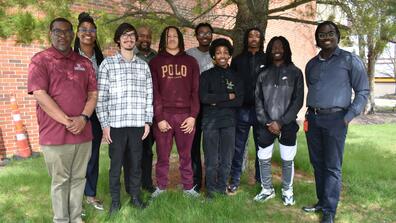Landmark study reveals gaps in behavioral healthcare system for racial and ethnic minorities

Feb. 1, 2023 — Different racial and ethnic groups experience different levels of access to behavioral healthcare. This is not because of genetic or biological differences, but because of the ways racism impacts marginalized individuals in the United States — and Ohio is no exception.
To quantify the true level of disparity in Ohio, a landmark study is being conducted by a partnership among Central State University (CSU), the Mental Health & Addiction Advocacy Coalition (MHAC), Multiethnic Advocates for Cultural Competence Inc. (MACC), and Ohio University (OU). The study, "Behavioral Health in Ohio: Improving Data, Moving Toward Racial and Ethnic Equity," will be released in four parts throughout 2023.
“The first installment provides an overview of the issues. The second focuses on workforce, the third looks at treatment, and the fourth addresses funding,” explained Joan Englund, Executive Director of the Mental Health & Addiction Advocacy Coalition. “The findings from each one will provide stakeholders with essential resources for building a stronger, more equitable behavioral healthcare system in Ohio.”
The first installment, released on Jan. 18, reveals many of the barriers to care which marginalized individuals experience, including stigma, racism, and provider bias. This all leads to poorer quality of care and worse behavioral health outcomes.
“We are hoping to come up with some actionable items that are based in data-driven and evidence-based strategies that will help policymakers bridge the gap and get a little bit closer to achieving equity within the behavioral health system within Ohio,” said Omesh Johar, Associate Professor of Psychology at Central State University.
The study’s data is important to higher education Mental Health and Wellness Programs because it refers to the many stressors, depression, and loneliness that students can experience while attending college.
“Central State provides wrap-around services to all of its students to help ensure their success during their college career,” Central State University President Jack Thomas added.
The study also provides recommendations based on the findings, such as improving data collection; tailoring prevention and treatment interventions to be culturally competent; training elected officials in cultural competency; and setting up a task force that will hold stakeholders accountable for reporting positive change.
“We want to ensure every Ohioan who needs mental health or substance use support is considered and has access,” says Tracy Maxwell Heard, Executive Director of Multiethnic Advocates for Cultural Competence, Inc. “And not just access, but access to care that provides the best chance for full recovery or the best possible outcome. That means making sure they feel seen and understood, which means seeing people who look like them among those providing the services, making sure the language barrier is addressed, and making sure there is an understanding within the workforce of the cultures being served.”
With this study, the state has an opportunity to begin addressing the disparities in Ohio’s behavioral health system, which will positively impact society, politics, education, and public discourse for all Ohioans. Tracy Plouck, Assistant Clinical Professor at Ohio University, says, “Our research team hopes that the findings and recommendations from this project will be used by policymakers and advocates to help affect change and help people achieve better access and a higher quality of care where today inequality exists.”
###
About Central State University: Central State University is a public HBCU and 1890 Land-Grant Institution with a 135-year tradition of preparing students from diverse backgrounds and experiences for leadership, research, and service. Central State ranks among U.S. News & World Report’s best colleges in five categories, including Best Undergraduate Engineering Program and Top Public Schools. The University fosters academic excellence within a nurturing environment and provides a solid liberal arts foundation and STEM-Ag curriculum leading to professional careers and advanced studies globally.
EEO Statement: Central State University, an 1890 Land Grant Institution, is committed to the full inclusion of all people and does not discriminate based on race, age, ancestry, color, disability, gender identity or expression, genetic information, HIV / AIDS states, marital or family status, military status, national origin political beliefs, religion, sex, sexual orientation, or veteran status. If reasonable accommodations are needed, please contact the Department of Human Resources at (937) 376-6540. Affirmative Action/Equal Opportunity institution


